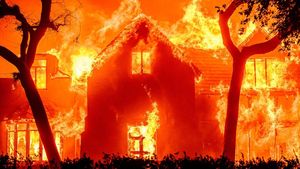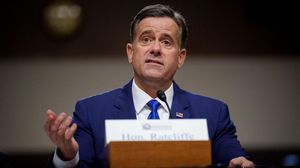A Culver City man is facing legal consequences after his drone crashed, damaging key firefighting aircraft during the Palisades Fire earlier this month. The incident, which has drawn attention to the dangers of reckless drone operations near wildfires, unfolded on January 9, 2025, when Peter Tripp Akemann, 56, launched his unmanned aerial vehicle from the top level of a parking garage located in Santa Monica.
The drone flew over 1.5 miles toward the Pacific Palisades fire area before colliding with one of the Super Scooper planes sent from Quebec to aid firefighting efforts. This collision resulted in significant damage, leaving a hole approximately 3 inches by 6 inches in the left wing of the Super Scooper, which was forced to temporarily ground its operations—hampering firefighting efforts at a time when every minute counted.
“This defendant recklessly flew an aircraft...to protect lives and property,” said Joseph T. McNally, Acting U.S. Attorney, emphasizing the seriousness of the offense.
The crash occurred even though the Federal Aviation Administration (FAA) had issued temporary flight restrictions, explicitly prohibiting drone flights due to the severe risk posed to aerial firefighting assets. According to the investigation, Akemann lost sight of his drone shortly after launch, leading to the unintended collision with the firefighting aircraft. Maintenance crews discovered the damage upon landing, prompting them to remove the Super Scooper from its firefighting duties for repairs.
Akeman will plead guilty to indulging in unsafe operation of the unmanned aircraft—a misdemeanor violation. His plea agreement stipulates he must pay restitution of at least $65,169 to cover the damages incurred by the Quebec government and the aircraft repair company. Further, he is mandated to complete 150 hours of community service, actively supporting wildfire relief efforts across Southern California.
“Lack of common sense and ignorance of your duty as a drone pilot will not shield you from criminal charges. Please respect the law, respect the FAA’s rules and respect our firefighters and the residents they are protecting by keeping your drone at home during wildfires,” warned Akil Davis, Assistant Director, FBI's Los Angeles Field Office. This case underlines the dangers faced by aerial responders and serves as a cautionary tale for drone operators.
The Palisades Fire, which ignited on January 7, 2025, had overwhelming impacts, spanning over 23,448 acres and leading to tragic losses, including 12 civilian lives, injuries to several individuals, and damage to thousands of structures, killed hopes of many across the region. The Eaton Fire, which started concurrently, mirrored this devastation, claiming 17 additional civilian lives. The coordination of aerial resources is imperative when addressing such serious threats to public safety.
This legal development occurs as California continues to combat the increasing frequency and ferocity of wildfires, exacerbated by changing climate conditions. State and federal responses are continuously evolved to protect both the lives of those fighting fires and residents caught within active firestorms.
Akemann faces potential penalties upon sentencing, including up to one year of imprisonment, supervised release, fines amounting to $100,000, or twice the gross gain or loss caused by the offense, whichever is larger. Such outcomes reflect the intense scrutiny and legal accountability operators face—especially when their actions interfere with first responders engaged in life-saving missions.
Indeed, Akemann is scheduled to appear before the U.S. District Court in Los Angeles soon, where he will formalize his plea. The case brings to light the legal and ethical responsibilities drone operators must uphold, particularly during emergencies akin to those faced amid wildfire scenarios.
Moving forward, authorities are reminding all drone pilots of the existing regulations and the dire consequences of violating them, especially when lives depend on the swift actions of those trying to extinguish raging infernos. This incident reinforces the alignment between community duty and law enforcement collaboration, showcasing the persistent effort to maintain safety standards amid rising threats posed by wildfires triggered by environmental factors.



